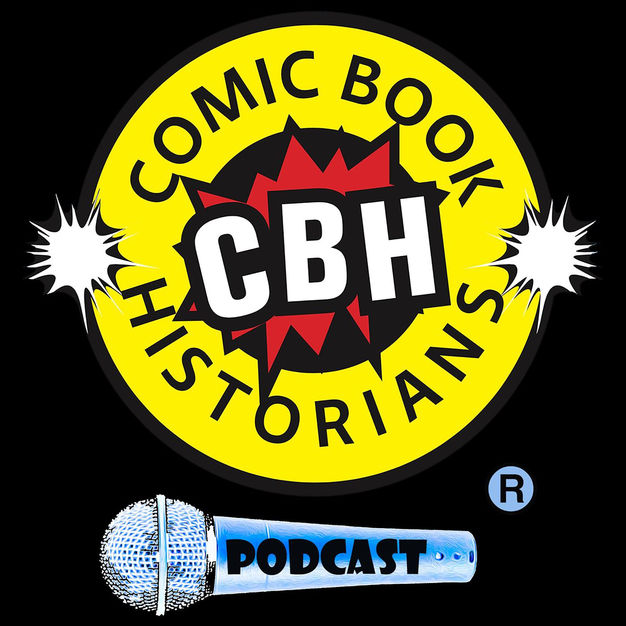
Comic Book Historians
Comic Book Historians
Alex Grand, Jim Thompson and guest co-hosts start off a comic book history discussion between fans, historians and scholars in determining what happened and when in comics, from strips and pulps to the platinum age comic book, through golden, silver, bronze and then toward modern. All genre's are open game here including Westerns, Comedy, Crime, Superheroes, Westerns, Horror, and Newspaper Strips. Causality and placement in the psychosocial spectrum is routinely discussed. We also take important time in interviewing professionals to get to the source of comic book history. Support us at https://www.patreon.com/comicbookhistorians
- 2 hours 50 minutesCraig Yoe Biographical Interview by Alex Grand
Craig Yoe’s biographical interview highlights his creative journey through personal struggles and reinvention, who transforms adversity into creativity while remaining true to his innovative spirit. He discusses his graphic novel Woman & Man+, a psychedelic reflection on leaving the U.S., a painful divorce, and using art therapy to rebuild his life. Raised in the Midwest, Yoe credits his parents for encouraging his creativity, with influences like Carl Barks, Marvel Comics, Steve Ditko, and Robert Crumb. Yoe’s 1960s anti-war activism, through protests and underground newspapers, reflected his pacifist values despite cultural losses like the deaths of Hendrix and Joplin. In the 1970s, he embraced the Jesus People movement, blending communal living, spiritual exploration, and work on Christian newspapers with artists like Rick Griffin. He oversaw David C. Cooke Bible and Life Pix comics before moving into toy design with Sid Diamond Toy Company and Marvin Glass toymakers. Yoe later became Creative Director for Jim Henson’s Muppets and founded Yoe Studio, building a decades-long career in design and storytelling. His publishing imprint, Yoe Books, has produced award-winning works celebrating comics history and pop culture.
Hombres en crecimiento
Yoe's new Graphic Novel found at Clover Press.
Interview ©2024 Comic Book Historians LLC
Si has estado buscando un lugar que te ayude a crecer, simplificar tu vida.Listen on: Apple Podcasts Spotify
1 January 2025, 1:00 pm - 1 hour 36 minutesBob Hall, Comic Artist, Writer & Actor Interview Part 1 by Alex Grand & Jim Thompson
Alex Grand and co-host Jim Thompson interview Bob Hall, from his early days as a comic reader, his University education in Theatre, his turned in first work for Charlton Comics, studying at the John Buscema Comic Art School, getting into Marvel under editor Archie Goodwin, then under new editor-in-chief Jim Shooter, the Yellowjacket Wasp story, Squadron Supreme with Mark Gruenwald, co-creating West Coast Avengers, Emperor Doom, Valiant Comics, Future Comics, his Joker graphic series for DC, and his modern theatre work. Edited & Produced by Alex Grand.
Hombres en crecimiento
#Avengers #SquadronSupreme #Valiant #Marvel
© 2021 Comic Book Historians
Si has estado buscando un lugar que te ayude a crecer, simplificar tu vida.Listen on: Apple Podcasts Spotify
2 December 2024, 11:00 am - 24 minutes 41 secondsFrank Frazetta Phone Interview by Steve Ringgenberg
In today's special episode, Alex Grand and Bill Field delve into a fascinating phone conversation from August 27, 1994, between comic book historian and writer, Steve Ringgenberg and the legendary fantasy artist Frank Frazetta. Steve Ringgenberg, known for his deep knowledge and contributions to the comic book industry, chats with Frazetta about his then-upcoming projects and his return to comics, albeit in a supervisory role.
Frank Frazetta, whose "Death Dealer" paintings have left a strong mark on the fantasy genre, shares insights into his collaboration with Glenn Danzig and Simon Bisley for Verotik comics. They discuss Frazetta’s transition from comics to painting, his influence on the sword and sorcery genre, and his unique approach to creativity in art that continues to inspire artists worldwide.
The conversation also touches on Frazetta's frustrations with creating statues, particularly his experiences working with Randy Bowen and the challenges of capturing the three-dimensionality well from all angles. Additionally, Frazetta reflects on his collaboration with Ralph Bakshi on the animated film "Fire and Ice," discussing his contributions to character creation and action scenes. Frazetta also expresses his frustration with the high art world for looking down on comic artists, despite their significant contributions to visual arts. Join us as we explore this rare and candid exchange, shedding light on the creative genius of Frank Frazetta and his impact on the world of fantasy art.
Hombres en crecimiento
Frazetta interview ©1994 Steve Ringgenberg
Si has estado buscando un lugar que te ayude a crecer, simplificar tu vida.Listen on: Apple Podcasts Spotify
1 November 2024, 11:00 am - 1 hour 38 minutesRob Liefeld Marvel Biographical Interview 2024 by Alex Grand
Alex Grand interviewed Rob Liefeld for the Comic Book Historians Podcast, a key figure in the revolution of comic books in the 1990s, known for his intense storytelling and artistic impact. The conversation focuses on Liefeld’s approach to comics, particularly his efforts to inject fun and boldness into his work, drawing inspiration from his inner child and childhood influences like Jack Kirby. Liefeld discusses how his passion for comics is reflected in his art, sharing anecdotes about his career, including his influence on the creation of X-Force and characters like Deadpool, emphasizing his commitment to staying true to the excitement and action-packed style of classic comic books. Additionally, he shares thoughts on the challenges he faced working in the industry, his interactions with other iconic figures, and the enduring appeal of action-driven, visually dynamic storytelling.
Hombres en crecimiento
#xforce #deadpool #wolverine #robliefeld #newmutants #xmen #weaponx #youngblood #cannonball
©2024 Comic Book Historians
Si has estado buscando un lugar que te ayude a crecer, simplificar tu vida.Listen on: Apple Podcasts Spotify
1 October 2024, 4:00 am - 47 minutes 34 secondsJim Mooney & Marv Levy interviews by David Armstrong
David Armstrong interviewed Golden & Silver Age great, Jim Mooney in 1997 on set at San Diego Comic Con about his entry into pulp magazines like Weird Tales, meeting Julius Schwartz and Mort Weisinger, entering comic books in the early 1940s with Fiction House, Ace Magazines and Timely, meeting Golden Age publishers like Victor Fox, entering DC Comics under Whitney Ellsworth, his friendship with Stan Lee, working on Spider-Man, and independent comics of the 1990s. Armstrong also interviewed Golden Age great, Marv Levy in 1998 on set at Long Island, New York about his entry into comic books in the early 1940s while in high school, working for Harry Chesler, Leon Harvey at Harvey Comics, Lloyd Jacquet, Bernard Baily, analyzing the Lou Fine comics vs the Jack Kirby style, serving in the military and leaving comic books for newspaper comic strips and advertising. Interview conducted, recorded and copyrighted to David Armstrong. Remastered, edited, timestamped and postproduction by Alex Grand.
Hombres en crecimiento
Si has estado buscando un lugar que te ayude a crecer, simplificar tu vida.Listen on: Apple Podcasts Spotify
2 September 2024, 11:00 am - 46 minutes 28 secondsIrwin Hasen & Harry Lampert interviews by David Armstrong
David Armstrong interviewed Golden Age great, Irwin Hasen in 1999 on set at San Diego Comic Con about his entry into comic books in the late 1930s, illustrating sports figures for newspapers including an interesting experience at the Daily Worker, working for Harry Chesler, covers for DC Comics, rivalry with Shelley Mayer, contributing to the Justice Society of America, working with Bill Finger, Alex Toth and a tense situation at a syndicate that caused him to walk away from a strip before creating Dondi. Armstrong also interviewed Golden Age great, Harry Lampert in 2000 on set at San Diego Comic Con about his entry into Max Fleischer's animation studio, entering comic books with Sheldon Mayer at All-American comics, working under Max Charles Gaines, co-creating the Flash with Gardner Fox, his humor approach to comics, penciling the Justice Society of America, joining the Army, working with Siegel and Shuster, Harry Donenfeld, Irwin Hasen, and DC filler pages after World War 2, until starting his own very successful advertising agency. Interview conducted, recorded and copyrighted to David Armstrong. Remastered, edited, timestamped and postproduction by Alex Grand.
Hombres en crecimiento
Si has estado buscando un lugar que te ayude a crecer, simplificar tu vida.Listen on: Apple Podcasts Spotify
1 August 2024, 10:00 am - 12 minutes 12 secondsAudiobook Announcement for Understanding Superhero Comic Books by Alex Grand
I'm thrilled to share something truly special with you. Writing my book was a seven-year journey, culminating not just in publication but also in an audiobook that's now available, thanks to an option I discovered with my publisher. Encouraged by my friend, Eric Bailey, I decided to lend my voice to the project. Leveraging years of experience from producing and audio engineering the Comic Book Historians podcast, I poured every ounce of my patience and expertise into recording and editing this audiobook over four months. It was a labor of love to get every detail just right. I'm delighted to announce that it's now available across all major platforms, including Audible, Google Play, and Chirp. For those who love comic history and prefer their reading on the go, this is for you.
audible link: https://a.co/d/4n7qXVJ
17 July 2024, 11:00 am - 1 hour 23 minutesTom Palmer, Inker & Illustrator Interview Part 2 by Alex Grand & Jim Thompson
Alex Grand and co-host Jim Thompson interview Tom Palmer about his extensive career as both inker and illustrator starting at the Frank Reilly school, learning from Jack Kamen, illustration for advertising, then inking various Marvel comic book pencilers in the Silver Age like Gene Colan, Neal Adams, John and Sal Buscema, and eventually others like Howard Chaykin, Walt Simsonson, and Ron Frenz on characters & properties like Dr. Strange, X-Men, Avengers, Dracula, Thor, Star Wars, Batman, Wonder Woman and more. Learn about his first 1968 penciling job with Stan Lee plotter, Roy Thomas writer, and inked by Dan Adkins and move forward in time to inking John Romita Jr's Kick-Ass. Tom was also friends with Stan Drake and gives interesting details of the car accident that killed Alex Raymond. Edited & Produced by Alex Grand. Interview ©Comic Book Historians 2020.
Hombres en crecimiento
Si has estado buscando un lugar que te ayude a crecer, simplificar tu vida.Listen on: Apple Podcasts Spotify
1 July 2024, 11:00 am - 1 hour 35 minutesTom Palmer, Inker & Illustrator Interview Part 1 by Alex Grand & Jim Thompson
Alex Grand and co-host Jim Thompson interview Tom Palmer about his extensive career as both inker and illustrator starting at the Frank Reilly school, learning from Jack Kamen, illustration for advertising, then inking various Marvel comic book pencilers in the Silver Age like Gene Colan, Neal Adams, John and Sal Buscema, and eventually others like Howard Chaykin, Walt Simsonson, and Ron Frenz on characters & properties like Dr. Strange, X-Men, Avengers, Dracula, Thor, Star Wars, Batman, Wonder Woman and more. Learn about his first 1968 penciling job with Stan Lee plotter, Roy Thomas writer, and inked by Dan Adkins and move forward in time to inking John Romita Jr's Kick-Ass. Tom was also friends with Stan Drake and gives interesting details of the car accident that killed Alex Raymond. Edited & Produced by Alex Grand. Interview ©Comic Book Historians 2020.
Hombres en crecimiento
Si has estado buscando un lugar que te ayude a crecer, simplificar tu vida.Listen on: Apple Podcasts Spotify
3 June 2024, 10:00 am - 1 hour 15 minutesSteve Rude The Dude biographical interview by Alex Grand & Bill Field
Join Alex Grand and Bill Field as they sit down with legendary comic artist Steve Rude in an enlightening episode of the CBH podcast. Dive deep into Rude's early influences, from his passion for 1960s Marvel to the impact of artists like Jack Kirby and Gene Colan on his style. Discover the pivotal moments of his career, from his initial challenges in the business to his successful partnership in creating Nexus with Mike Baron, his dislike of Marvel of DC in the 1980s, and his impression of the corporate side of comic books. Explore his artistic evolution and the personal stories behind his work, including his venture into fine art and the narrative of his documentary on bipolar disorder. Tune in for a masterful blend of art, storytelling, and personal struggle, reflecting over four decades of comic artistry.
Hombres en crecimiento
Si has estado buscando un lugar que te ayude a crecer, simplificar tu vida.Listen on: Apple Podcasts Spotify
2 May 2024, 4:00 am - 34 minutes 32 secondsNick Cardy interview part 2 by David Armstrong
David Armstrong interviewed Nick Cardy for a second round on set in 2005 about his time at the Eisner shop, Fiction House, illustrator influences, Lou Fine, anatomy, reference, army sketch book, his Paris exhibit, Science Fiction stories, design, page rates, Brushwork, advertising, his sense of religion, and a sex comic experience at comic con. Interview conducted, recorded and copyrighted to David Armstrong. Remastered, edited, timestamped and postproduction by Alex Grand.
Hombres en crecimiento
Si has estado buscando un lugar que te ayude a crecer, simplificar tu vida.Listen on: Apple Podcasts Spotify
1 April 2024, 10:00 am - More Episodes? Get the App
Your feedback is valuable to us. Should you encounter any bugs, glitches, lack of functionality or other problems, please email us on [email protected] or join Moon.FM Telegram Group where you can talk directly to the dev team who are happy to answer any queries.
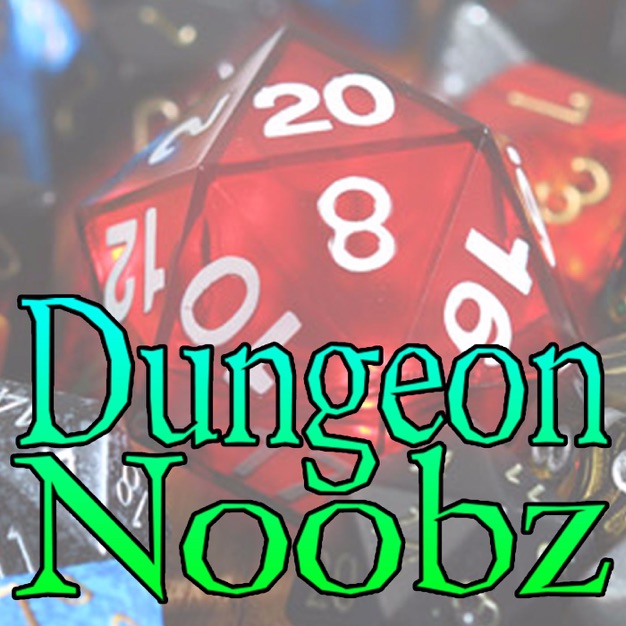 Dungeon Noobz 4e Actual Play D&D Podcast
Dungeon Noobz 4e Actual Play D&D Podcast
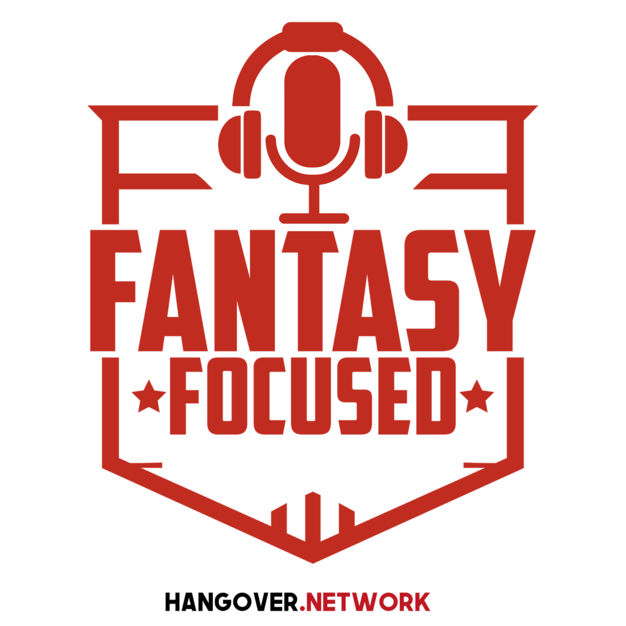 Fantasy Focused
Fantasy Focused
 Nobody Asked
Nobody Asked
 Cultivating Change with Martin Mayorga
Cultivating Change with Martin Mayorga
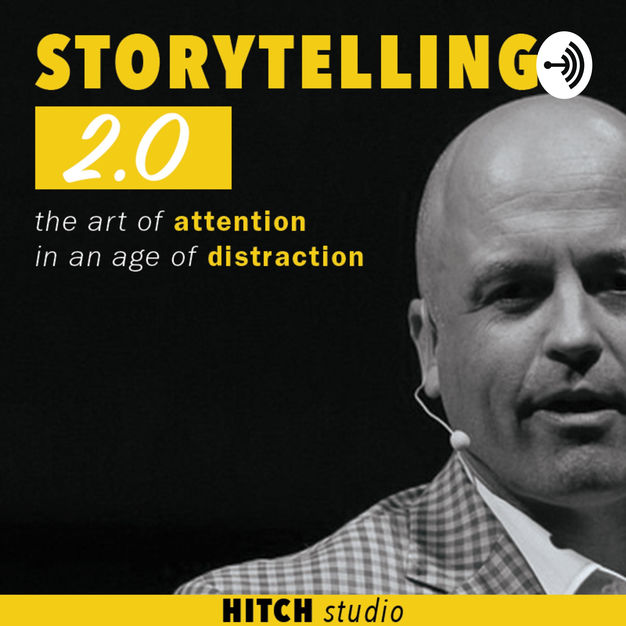 Storytelling 2.0: the art of attention in an age of distraction
Storytelling 2.0: the art of attention in an age of distraction
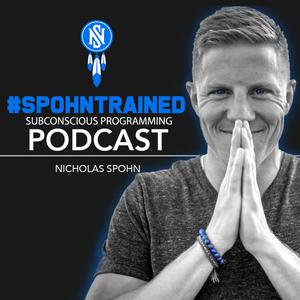 #Spohntrained Subconscious Programming Podcast
#Spohntrained Subconscious Programming Podcast